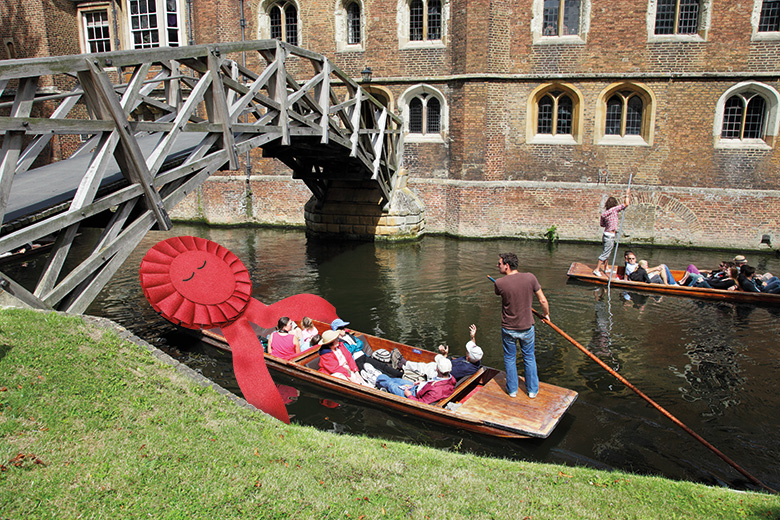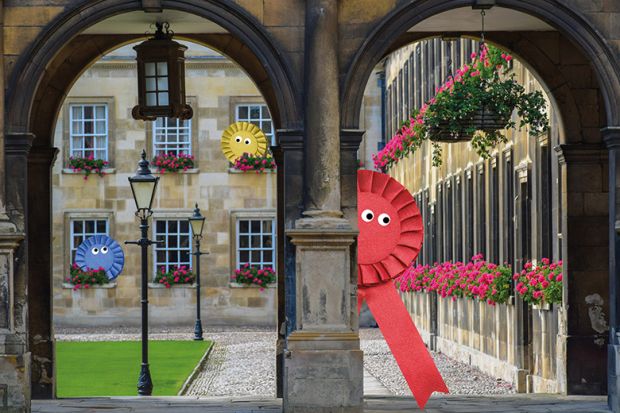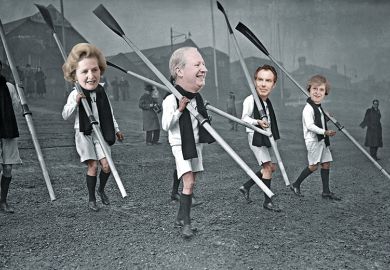"What next?” That is the question that scores of former UK Members of Parliament are likely to be asking on 9 June as they face up to life after defeat in the general election.
With Theresa May having announced the snap election only in April, most will have had little time to contemplate the prospect as they campaigned flat out to hang on to their jobs in the House of Commons. However, many more seats are at risk – even traditionally “safe seats” – than in previous contests because of unpredictable voter intentions around Brexit, the apparent collapse of the UK Independence Party as an electoral force and the Labour Party’s shaky poll ratings, which have on occasion in the campaign trailed the Conservatives’ showing by 22 points.
History suggests that some of those who find themselves out of a job on 9 June will end up working in higher education in some capacity. The most famous casualty of the 2015 general election, Labour’s Ed Balls, who had been shadow chancellor, ended up in visiting academic posts at Harvard University and King’s College London – although he has admitted that he took those positions partly to give himself some breathing space to assess his long-term career plans, which turned out to include dancing to almost 11 million viewers Gangnam-style on Strictly Come Dancing, sending the internet into meltdown.
Others MPs deposed in 2015 have taken full-time positions within universities. The former deputy leader of the Liberal Democrats, Sir Simon Hughes, became the Open University’s head of public affairs for a year, covering maternity leave from February 2016, having been an MP for 32 years. Fellow Lib Dem and former physics lecturer Julian Huppert, who lost his Cambridge seat by just 599 votes, took a position at Jesus College, Cambridge, focusing on science and technology policy. Both he and Hughes are attempting to regain their old seats.
Out-of-work MPs might hope that their years of political experience at Westminster will make them an enticing proposition for academic departments or even senior university management. But how do universities see it? Are there risks to institutions of employing ex-MPs? One question is whether political animals really relish the more mundane world of academia, in which, as scholar-turned-statesman Henry Kissinger once claimed, the “stakes are so small”? Do all politicians-turned-academics secretly hanker for the big political stage, on which their words could make headlines and exert national or even global influence?
“It is a big loss – being an MP is a 24/7 job, so a lot of people struggle to adjust to the change,” admits Andy Reed, who lost his Loughborough parliamentary seat in 2010, having been elected 13 years earlier in the New Labour landslide victory of 1997.
Reed, a keen sportsman who championed sport during his time at Westminster, eventually moved to Loughborough University, having been a frequent visitor to his local university while an MP. He is now a senior lecturer at its Institute for Sport Business, where he is involved with its MBA in international sports management.
While he is happy to be recognised frequently on campus as Loughborough’s former MP, the “ex-politician” tag can sometimes be unhelpful, he says, because it obscures the diversity of skills that former MPs possess.
“We’re not a homogeneous group,” he says, noting that “there are 650 [of us] in Parliament at any one time”, hailing from a wide range of professional backgrounds.
Regarding his own position at Loughborough, he says, “it took some time but we found a role that worked for both of us”. Having worked in local government before becoming an MP, his extensive contacts with the worlds of sport and politics are now benefiting the institution, he believes.
“We now do a lot of work about the impact of sport, which is where I’m quite strong,” he says. “I’m not an academic, but I can be a bridge between academia, politics and sport – I’m a bit of a networker and, on a big campus where people are not sure what others are doing, you need individuals to bring people together.”

One peril of hiring former politicians is that it can lead to accusations of political bias if not handled sensitively. The University of Adelaide has recruited several alumni who went on to political careers, but it is careful to ensure an equal spread across the political spectrum.
Julia Gillard – the former Labor prime minister who retired from politics in June 2013 after being ousted as party leader ahead of the federal election that year – is the South Australian institution’s most high-profile appointment. But Alexander Downer, a long-serving foreign minister under the right-of-centre Liberal government of John Howard, is another recruit, as is Natasha Stott Despoja, former senator and leader of the centrist Australian Democrats.
“The University of Adelaide has aimed to have a balanced array of former politicians among its emeritus staff, all alumni,” says Warren Bebbington, who stepped down as Adelaide’s vice-chancellor in May. He singles out Gillard as being “very generous with her time”, noting that she “regularly takes individual students as interns in her office, as well as addressing seminars and giving public lectures when she is available”.
In the US, the movement of people between politics and higher education is particularly common. But the country’s increasing political polarisation only heightens the risk of reputational damage arising from hiring politicians. In May, for instance, George Washington University attracted criticism from its own staff for hiring the Republican senator and recent presidential candidate Rand Paul to teach a course on “dystopian visions” this autumn. Some questioned whether the libertarian politician and former eye surgeon had the qualifications or academic background to teach a course ostensibly about dystopian fiction, while others worried that he would use the class as a platform to promote his agenda opposing abortion, gun control and big government.
“Teaching something on dystopian history…seems to be a thinly disguised political ideology course, masquerading as intellectual inquiry,” Elizabeth Anker, associate professor in American studies and political science at George Washington, told the university’s student paper, the GW Hatchet, on 1 May. The course, she continued, could harm the university’s reputation and the student academic experience.
“You need a scholar or teacher who is trained in that aesthetic tradition and can present [dystopian novels] as what they are, which is complex works of art, not necessarily political ideologies,” added Holly Dugan, associate professor of English at George Washington, who has taught courses on dystopian fiction. But Ben Vinson, dean of the university’s Columbian College of Arts and Sciences, told the paper that Paul’s “unique voice as a sitting senator would provide an engaging backdrop for our students”.
Meanwhile, Martin O’Malley, the former Democratic governor of Maryland and another 2016 presidential candidate, will teach a political leadership course at the University of Maryland this autumn. The former Baltimore mayor, who has denounced Donald Trump as a “fascist” and is tipped to try again for the Democratic presidential nomination in 2020, also held a visiting professorship at Boston College’s law school during the spring 2017 semester.
Employing politicians with such strong ideological views does present risks to teaching and institutional reputation, says Lord Giddens, director of the London School of Economics from 1997 to 2003, where he is now emeritus professor of sociology.
“There is obviously a conveyor belt between Washington and universities, but I wonder if this is the best thing,” he tells Times Higher Education. In his view, the employment of politicians by universities “should be kept pretty limited” because academics should “keep their political views separate from their teaching”, stressing instead the “primacy of knowledge and objective facts”. Guest lecturers have a freer hand, but even they, in Giddens’ view, must still “make it clear when they are departing from” political neutrality.

In appointing a former or aspiring politician to a university post, institutions take the risk that the holder might not approach the job seriously and treat it as merely a stopgap. For instance, after overseeing the liberation of Europe as supreme commander of the Allied Forces during the Second World War, Dwight D. Eisenhower was appointed president of Columbia University in 1948. This is widely viewed as having been a mistake. Eisenhower, a career military man, had little in common with faculty and became known as an absentee president who used Columbia for his own interests – namely, gathering support for his successful run for the US presidency in 1952.
“Eisenhower was put in a safe place at Columbia by the Republican Party to keep him warm in order to run him as president,” says Stephen Joel Trachtenberg, emeritus president of George Washington, who oversaw the recruitment of numerous former denizens of Capitol Hill into the academic ranks during his time in office.
“Some [such appointments] turn out better than others,” he reflects. “A few become real academics, even scholars. Some, like retired athletes or military [leaders], simply retell old war stories until even they are bored silly.”
Potential appointments should therefore be judged on their own merits, he says, echoing Reed’s point about politicians’ range of skill sets. “The very best add value by spicing up classes that can [otherwise] be didactic and dry, [but] the worst lower the quality of instruction. I recommend a two-year visiting trial run as a start [so that the university can] make stay-or-go decisions that are evidence-based.” Department heads must ensure that any politician who enters academia “does not retire on the job”, which can happen because some “underestimate how much work being a professor can be”.
But equally, their managers should not be too quick to label such appointees disloyal if they ultimately move on. It is unrealistic, Trachtenberg says, to expect former politicians to cast off their previous ambitions. University posts allow them to “cool off, regroup and go on to a new appointment or run for office – it’s all good”.
One former North American politician who has no intention of returning to the electoral bear pit is Michael Ignatieff (pictured below), who exited Canadian politics in 2011 after having presided over the Liberal Party (now led by Justin Trudeau) as it sank to its worst result in Canadian electoral history. Then again, Ignatieff, like Huppert, is a bona fide academic by background. The celebrated historian, journalist and human rights scholar held senior posts at Harvard, Oxford and Cambridge before he returned to his native land after three decades of exile to enter politics.
Within a year of being elected to Canada’s House of Commons in early 2006, he became the Liberals’ deputy leader, and in May 2009 he assumed full control of the party. Less than 24 months later, however, he had not only presided over a landslide defeat but had even lost his own parliamentary seat – the first Liberal leader to suffer this ignominy – amid accusations of being out of touch, elitist and self-serving. Conservative Party attack ads with the slogan “Michael Ignatieff: just visiting” proved highly effective.
Now president of Hungary’s Central European University, Ignatieff tells THE that those who experience electoral defeat often have more insight into the workings of the political process than those who have enjoyed only success. And this, he believes, makes them more effective educators. His own defeat revealed to him how “messy the political process is, and how much unintended consequence, chance and timing play in things”, he explains. “I hope [some of the] people who lose their seats in June go into academic life – universities should definitely hire them,” he adds.
And, like Trachtenberg, he believes that the inevitability of some political hires taking flight again once they spy the next political opportunity is a price worth paying for employing the sharpest political minds.
“The good politicians want to go back in [to politics],” he concedes. But he also believes that those from a political background can still “have a good time teaching a class of students”. And having a politics lecturer who knows the practicalities of political life can provide an “antidote to the tendency towards teaching abstract theory” disconnected from modern life, he adds.

Ignatieff is among a considerable body of former politicians who have been recruited by universities directly into executive roles. For instance, John Brademas, a veteran Democratic congressman, served with distinction as New York University’s president from 1981 to 1992. Former Democratic senator and state governor David L. Boren is the current president of the University of Oklahoma, and former Republican congressman Mark Kennedy – defeated in the 2006 mid-term elections – is now president of the University of North Dakota.
In the UK, Baroness Amos, a former Labour Cabinet minister and diplomat, is the director of Soas, University of London, while Bill Rammell, a former Labour higher education minister, leads the University of Bedfordshire. Former education secretary Ruth Kelly now serves as pro vice-chancellor for research and enterprise at St Mary’s University, Twickenham, while Baroness Warsi – the first Muslim woman to serve in the Cabinet under David Cameron – is pro vice-chancellor at the University of Bolton.
“Management roles often fit [former politicians] nicely,” says Trachtenberg, adding that those who have worked as ambassadors and judges also make “excellent administrative staff…We [at George Washington] always have a retired admiral as associate dean of our law school, to run the school.”
Ignatieff, whose political skills are currently under the microscope after Hungary’s government passed a law threatening the George Soros-backed institution’s ability to continue operating in Budapest, says that politicians can make good university managers because they have experience of effecting significant change.
“Good politicians know how to get things done, whereas academics generally don’t have that kind of experience,” he says.
Rammell, who lost his parliamentary seat in 2010, believes that being a government minister amounts to “unrivalled experience” for a would-be vice-chancellor “in terms of understanding policy and strategy”. But this alone does not make politicians a good fit for university management, he concedes.
“You need to be a politician who has a strong commitment to education – in my case, it is a lifelong commitment, having been a manager at a university before I became an MP, and then a higher education minister in government,” he says.
Having some experience outside politics is also important, says Rammell, who was general manager of the students’ union at King’s College London – working alongside a young events manager called Ricky Gervais – and business manager at the University of London Union before being elected to Parliament in 1997.
In addition to possessing the necessary skill set, former MPs who want to establish themselves in academia must make a clean break from politics, Rammell believes.
“I fought incredibly hard to hang on to my seat and hadn’t thought about what I’d do next, but I made the decision very quickly that I would not go back into politics,” he says. While it is “honourable and respectable” for ex-MPs to fight to win back their old seats, “it does not help you with your career”, Rammell says.
He admits that “there are moments when you think it would be interesting to be at the centre of [politics] again”, but he now takes “enormous satisfaction from leading a university and making changes [at an institution that] I am passionate about.”
And while those with ambitions to lead at the highest national level may, like Eisenhower, spend most of their time in academia staring out the metaphorical window, those whose presidential ambitions have been already fulfilled can positively enjoy the relatively quiet life. One former US president, William Howard Taft, who served between 1909 and 1913, apparently found his subsequent life as a law professor at Yale University so pleasant that he lost 80 of his 335 pounds: a weight that makes him the heaviest president in US history.
Weight will not be an issue for Barack Obama, a former law lecturer at the University of Chicago, whom many expect to take on some kind of academic role now that he has left the White House. He is thought most likely to return to Chicago, where his presidential library will be built, although another contender is his alma mater, Columbia University in New York, where his foundation has a presence.
France’s new president, Emmanuel Macron, was until recently set on becoming a part-time professor at the London School of Economics, his mentor Alain Minc told the Evening Standard last month. Should he wish to fulfil that ambition after occupying the Élysée Palace, the institution would surely welcome him with open arms.
Those UK MPs out in the cold on 9 June are unlikely to be in such high demand. Nor will those expecting defeat have had much opportunity to put out feelers to their local vice-chancellor, given the precipitous way the election was called. According to Loughborough’s Reed, some Labour MPs have told him that they are resigned to a period of unemployment.
But if they do secure an academic toehold, they may find it as conducive as Taft did. “You miss politics, but there are different phases to life,” Reed reflects. “Things [in politics] have changed a lot since I left, with people now criticising you every moment on Twitter. I’m not sure if I could cope with politics today”.
POSTSCRIPT:
Print headline: Political considerations
Register to continue
Why register?
- Registration is free and only takes a moment
- Once registered, you can read 3 articles a month
- Sign up for our newsletter
Subscribe
Or subscribe for unlimited access to:
- Unlimited access to news, views, insights & reviews
- Digital editions
- Digital access to THE’s university and college rankings analysis
Already registered or a current subscriber?


